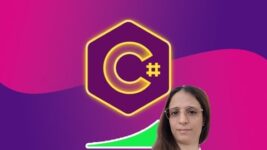
C# Mastering Course For Professionals
Description
This advanced C# programming course is designed for developers who have a solid understanding of the basics and are looking to deepen their knowledge and skills. The course covers a range of advanced topics that are essential for building robust, efficient, and scalable applications.
Course Topics:
1. Delegates:
Understanding delegates and their use cases
Creating and using delegates
Multicast delegates
2. Anonymous Methods:
Introduction to anonymous methods
Using anonymous methods with delegates
Benefits and limitations of anonymous methods
3. Dynamic Type:
Overview of the dynamic type in C#
Working with dynamic objects
And more…
Course Objectives:
By the end of this course, learners will be able to:
Utilize advanced C# features to write efficient and maintainable code
Implement asynchronous and synchronous methods effectively
Work with various data structures such as stacks, queues, and dictionaries
Perform file and directory operations with ease
Handle dates and times in C# applications
This course is ideal for developers who have a basic understanding of C# and want to advance their skills to the next level. Whether you’re working on desktop applications, web development, or any other C# projects, this course will provide you with the knowledge and tools you need to succeed.
So if you want to learn about the advanced topics in C# programming language and use them in your programs and applications, don’t hesitate and join the course.
Who this course is for:
Aspiring Developers: Individuals who have a intermediate understanding of C# and want to advance their skills to the next level
Junior Developers: Those who are already working with C# but want to deepen their knowledge of delegates, collections and asynchronous calling
Students: Computer science or software engineering students looking to strengthen their understanding of advanced C# concepts.
Professionals: Developers from other programming languages who want to transition to C# and need a solid foundation in intermediate concepts.
Show more


